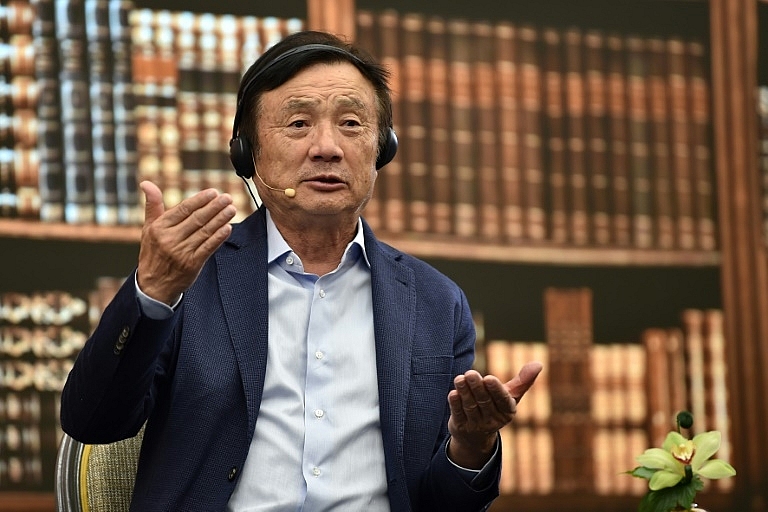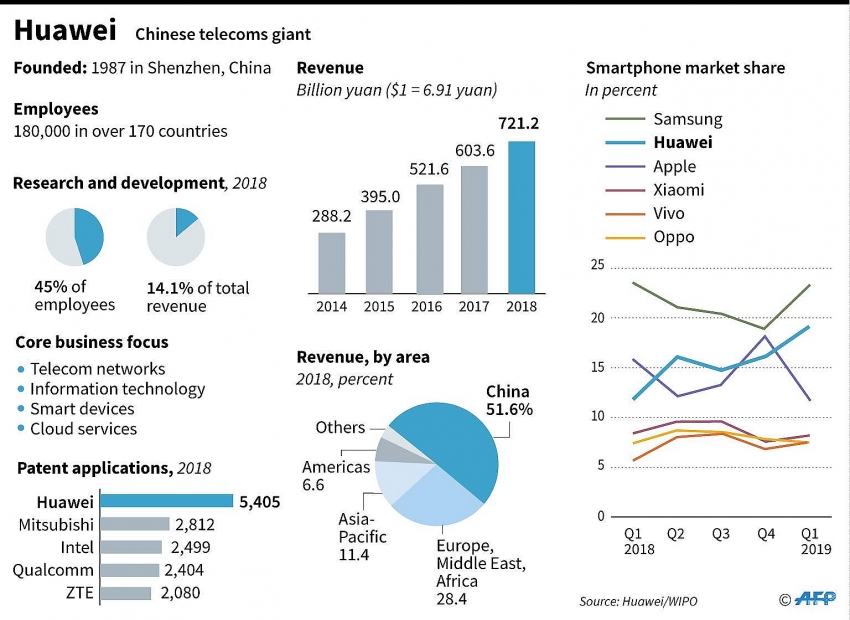Huawei CEO says underestimated impact of US ban, sees US$100 billion revenue dip
 |
| Huawei founder Ren Zhengfei attends a panel discussion at the company headquarters in Shenzhen, Guangdong province, China June 17, 2019. AFP / HECTOR RETAMAL |
This is the first time that Huawei has quantified the impact of the US action against the company, and Ren's downbeat assessment comes after weeks of defiant comments from company executives who maintained Huawei was technologically self-sufficient.
Huawei had not expected that US determination to "crack" the company would be "so strong and so pervasive", Ren said, speaking at the company's Shenzhen headquarters.
The company had reported revenue of 721.2 billion yuan (US$104.16 billion) last year, up 19.5 per cent from 2017.
"We did not expect they would attack us on so many aspects," Ren said but added that he expects a revival in the business in 2021.
"We cannot get components supply, cannot participate in many international organisations, cannot work closely with many universities, cannot use anything with US components, and cannot even establish connection with networks that use such components," Ren added.
"In 2021, we will regain our vitality and (continue to) provide services to human society."
 |
| Factfile on China's Huawei, including revenues, core business areas, patent applications and smartphone market share. (Graphic: AFP / Gal ROMA AND Sophie RAMIS) |
Huawei will not cut research and development spending despite the expected hit to the company's finances, said Ren.
However, he added, the company will slash production over the next two years as it grapples with the US push to isolate the company internationally.
"In the coming two years, the company will cut production by US$30 billion," Ren said.
Huawei's international smartphone shipments have dropped 40 per cent this year, he acknowledged.
The US government put Huawei on a trade blacklist in May that bars US suppliers from doing business with it because of what Washington says are national security concerns.
At the time, Ren said the restrictions "may slow, but only slightly" the company's growth.
President Donald Trump's administration has essentially banned Huawei from the huge US market and barred American tech companies from supplying the Chinese company with vital components without permission from Washington.
Washington fears that systems built by Huawei, the world's leader in telecom equipment and the number two smartphone producer, could be used by China's government for espionage.
The Trump administration also is pressuring other countries to ban Huawei equipment from their networks, particularly in the coming rollout of super-fast 5G networks, a project in which Huawei had been expected to play a leading role. The restrictions have prompted companies, including Alphabet Inc's Google and British chip designer ARM, to limit or cease their relationships with Huawei.
The US campaign has already spurred a number of major technology companies, including major semi-conductor suppliers and brands such as Facebook and Google, to suspend cooperation with Huawei.
What the stars mean:
★ Poor ★ ★ Promising ★★★ Good ★★★★ Very good ★★★★★ Exceptional
Related Contents
Latest News
More News
- Rising consumption and travel fuel ‘Tet season’ stocks (February 11, 2026 | 11:43)
- Education as strategic capital: why Dwight School Hanoi represents a long-term investment in Vietnam’s future (February 10, 2026 | 19:00)
- Green logistics–the vital link in the global energy transition (February 09, 2026 | 19:35)
- Wages and Lunar New Year bonuses on the rise (February 09, 2026 | 17:47)
- Temporary relief for food imports as businesses urge overhaul of regulations (February 07, 2026 | 09:00)
- Opella and Long Chau join forces to enhance digestive and bone health (February 06, 2026 | 18:00)
- Vietnam-South Africa strategic partnership boosts business links (February 06, 2026 | 13:28)
- Sun PhuQuoc Airways secures AJW Group support for fleet operations (February 06, 2026 | 13:23)
- Pegasus Tech Ventures steps up Vietnam focus (February 05, 2026 | 17:25)
- The generics industry: unlocking new growth drivers (February 04, 2026 | 17:39)

 Tag:
Tag:




















 Mobile Version
Mobile Version